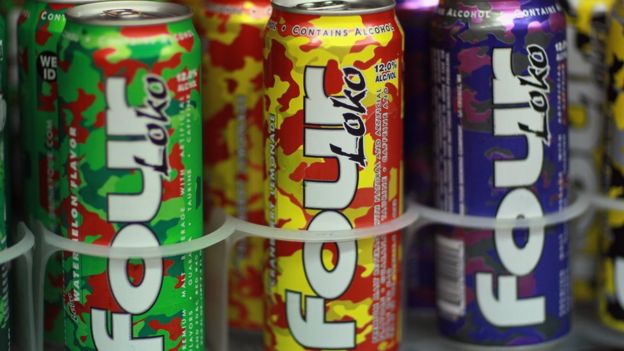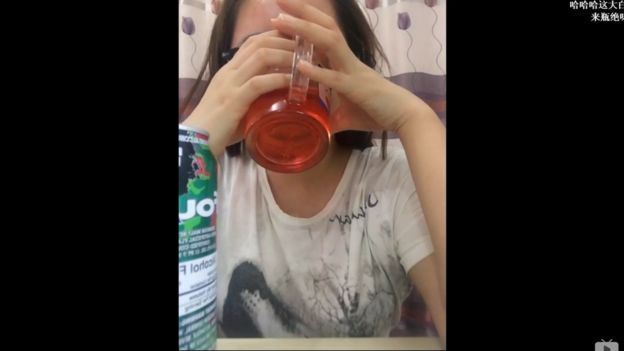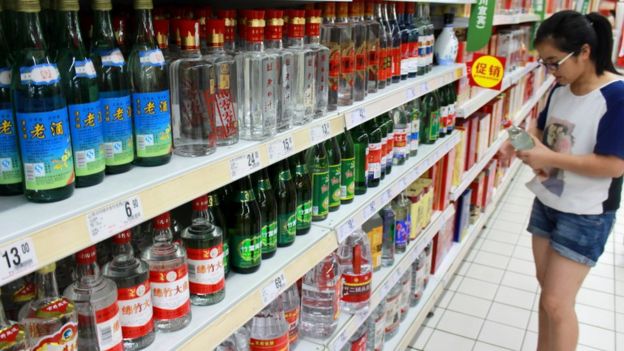An infamous drink, known as "blackout in a can" in the US, has made its way to China.
Four Loko, a fruit-flavoured alcoholic beverage with at least 12% alcohol content, was a well-known party drink in the US, and was removed from stores in several states until its ingredients were adjusted.
It's picked up steam in recent months in China, with people nicknaming it the "lose virginity" drink because they consider the alcohol to be dangerously strong.
Several vloggers have uploaded videos of themselves drinking the 695ml cans of drink - with varying degrees of success.
And the beverage made headlines recently after three women in their twenties smuggled the drink into a karaoke bar, passed out after drinking it and had their belongings stolen. So what exactly is Four Loko, and what are people saying about it?
Four Loko has been described in Chinese social media, and by some Chinese online retailers, as a drink combining alcohol and caffeine. Some people claim the combination makes it particularly potent, and can make people black out after drinking just one can.
But that's not exactly true - Four Loko removed caffeine (as well as stimulants guarana and taurine) from its products in 2010, after the US's Food and Drug Administration raised health concerns.
And Four Loko's parent company says the online retailers offering Four Loko drinks with caffeine are "imposters" and "unauthorised retailers" with no affiliation to the official company.
 Image copyright Getty Images
Image copyright Getty Images
One user on microblog Sina Weibo, Cheng Xiaotian, wrote: "Four Loko? A 'lose virginity' drink? Haha, I drank a whole can and several cans of beer - yet my face isn't flushed and my heart isn't pounding."
Meanwhile, user Zhou Zeyu had a less pleasant experience, writing: "Four Loko you're really powerful - I got drunk on just two glasses."
And the most popular videos uploaded online - often showing people appearing drunk after drinking Four Loko, have attracted tens of thousands of views.
 Image copyright @哎呀呀呀是二又/Bilibili.com
Image copyright @哎呀呀呀是二又/Bilibili.com
"A can of Four Loko has the same alcohol content as 4.7 cups of vodka, or 4.7 bottles of beer, or 4.7 glasses of red wine," an article in state news agency Xinhua said.
"The fruity flavours hide the taste of the alcohol, so it's easy to drink, and someone can finish a whole can in a short amount of time.
"Whether you're male or female, if someone at a party tries to force you to drink Four Loko, you should be alert and stay away from them," the article added.
Why is China obsessed with drinking anyway?
Many governments around the world worry about their citizens drinking too much - but the Four Loko trend is particularly poignant in China given its drinking culture.
Consuming alcohol is considered essential at many business dinners and wedding banquets, as toasting and drinking with others is considered a sign of respect.
And it's a culture that can catch expats and visitors by surprise - as refusing to drink when toasted is considered rude.
Helen (not her real name), a lawyer who makes frequent business trips to mainland China, says: "A business meeting will usually be followed by a business dinner, and drinking is essential... it's mostly to give 'face' to potential business partners.
"Usually, people won't take 'no' for an answer."
 Image copyright Reuters
Image copyright Reuters
"People in China normally drink strong liquors and spirits, not just wine, so they tend to think their alcohol tolerance links to how capable they are," Helen says.
This sometimes leads to tragic consequences.
Earlier this week, Chinese media reported that a bridesmaid in Hainan died after drinking large amounts of rice wine at a wedding, encouraged by several onlookers.
The incident prompted debate about who was responsible for her death, and discussions on China's drinking culture.
"This culture of urging people to drink is really disgusting," one user wrote.
One article circulating online gave people tips on how to resist pressure to drink alcohol, including pretending to have taken medication, and toasting people with tea instead.
source:bbc.com


Comments